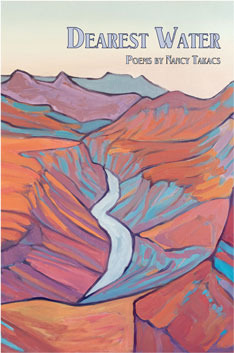|

Dearest Water
Poems by Nancy Takacs
poems 44 ~ 79 pages
Price: $19.95 + S & H
Publisher: Mayapple Press
ISBN: 978-1-952781-09-4
To Order: http://mayapplepress.com/dearest-water-nancy-takacs/
Reviewed by Michael Escoubas
In one of Wallace Stevens’ lesser known and underappreciated poems, “Poetry is a Destruc-tive Force,” we find these lines:
That’s what misery is
Nothing to have at heart.
It is to have or nothing.
It is a thing to have,
A lion, an ox in his breast,
To feel it breathing there.
After reading Nancy Takacs’ latest collection, Dearest Water, I’m struck by the force and wisdom in her work. Poetry is a lion, an ox in her breast.
Dearest Water is structured in four divisions: 1) Poems for Women Only, 2) Wildness, 3) Invisible Jewels, and 4) Notes to God from County Road H.
Each division, in its own way, bears witness to the lion and the ox. Poetry, for Stevens, carries with it the power to change people. Indeed the power to change the way things are. While only the poet knows, with certitude, whether she concurs, the idea resonates with this reviewer.
A Word About Style
Nancy Takacs writes in free verse. Her poems are structured in couplets, tercets, quatrains, and logical paragraph breaks. A nice variety of presentation. She does not force-rhyme. When rhymes or half-rhymes occur, they are occasional enhancements applied to what she is doing.
Takacs is a student of the natural world. Flora and fauna inhabit her work. Within this broad category, I found animals, birds, bees, trees, canyons, colors, fishes, and ghosts. Her poems are replete with emotional resonance born from an abundant storehouse of memories and experiences.
Poems for Women Only
Dare I say that the poems in this section are vitamins and minerals for men? Take for example her short poem, “Making Up”:
is like the first pickle from a mason jar,
raspberry jam in the tapioca. My husband
speaks to me for the first time after our
argument that shimmered with hooves.
Now his voice is all hallowed and velour.
Now my voice is hazy and mango. We halt
our sorrows for now. We go out to the tulips
and have a cookie. I put on my magenta
sweatshirt. Her dusky sky has one tamp of bitter.
Holding a hand can be like a hornet in a balloon.
It takes two hours for our toes to get drowsy.
Wildness
This section illumines the poet’s concern for animals, the environment and social justice. Love is pervasive within her environmental concerns.
“Wolverine” is a case in point:
I’m kind of a loner like you, skunk-bear,
but way too soft, lounging
on my futon with a paperback
on my breast, digesting tasty
memories of Proust.
… …
Wolverine, I’ve leaned
into creeks for watercress,
picked the raspberries
bears have been in,
looked into the eyes
of great horned owls,
glimpsed the bear, the fox.
… …
Humans call you terrible,
caribou-hound, bone-crusher,
tooth-eater. Trappers wait for you,
snowmobilers spin across your space.
I hope you’re still running and running,
hunting and hunting somewhere
wide and cold enough for you.
In the same poem she avers, I should have let the wild be wild. This after making friends with and even feeding several wild creatures. Indeed, “wild” is pervasive in Takacs’ work. Her advocacy is multiplied through poetic craftsmanship. She is able to take a step back, harness her emotions, weaving high art into environmental concerns.
Invisible Jewels
Upon encountering this section, I asked myself: What is the meaning of this section title? How can a jewel (something palpable) be invisible?
As I pondered this, I noticed a tonal change within the poems themselves; a loosening of the poet’s diction. The poems took on an aura of simplicity. They became like well-seasoned entrées. “What My Dog Knows,” begins to pull the curtain back on how “ordinary things” become “invisible jewels”:
is how the smell of shampoo
means I’m going out,
and the blow dryer
means without her.
She still asks
with her butterfly ears
wide open.
She is pine-scented
from yesterday’s bath,
brushed, ready
to go if I want her,
trot to the lake and roll
in something rotten
as soon as I turn my back.
She’s small but loves to bark
at all the big dogs in the park,
slip her collar
and lunge for their throats.
If I would only
take her,
And let her.
Notes to God from County Road H
The lead poem, “Drought” is akin to prayer. In 16 poems of varying length, Takacs lifts her voice to God about the way things are in life. I’ve done the same thing myself. This poet raises her voice much better than me, however!
She invites her readers to walk with her “where oceans of stars / once fell into orbit, / and rolled up on the shore / of the skies, …” This wide-ranging series serves as catharsis for Takacs. The outer visible world speaks to that which is invisible within her heart … hope within the reality of drought. Look for signs that drought may be multi-dimensional in the poet’s mind.
I led with a reference to a poem by Wallace Stevens. These lines from the same poem, seem a fitting closure to this excellent collection:
He [poetry] is like a man
In the body of a violent beast.
Its muscles are his own …
The lion sleeps in the sun.
Its nose is on its paws.
It can kill a man.
|


